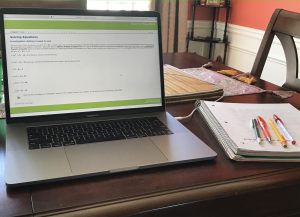The Silver Lining of Online Summer Classes
May 11, 2020
The sun is shining extra bright on this extra special day. A surge of pupils exit another year of high school with a face filled with pleasure, relieved of weekly assignments, tests, and projects. However, some motivated students maintain this state of mind for a short-lived week.
In this day and age, Forsyth County students are utilizing online courses over the summer with the help of Georgia Virtual School (GAVS) and the favored Forsyth Virtual Academy(FVA). Numerous students predispose that summer courses are stressful and time-consuming. However, an online summer course on the two websites lasts a total of 5 to 6 weeks, with extensive help from teachers at most hours of the day. The workload is also not demanding, although GAVS and FVA suggest that a student should plan on spending 3 to 5 hours for a 6-week-course, or 5 to 7 hours for a 5-week-course. Most students turn out spending 2-3 hours or less to finish the daily assignments.
Taking online classes over the summer is actually beneficial to a high school student, because it helps teens stay in the “study mode” and helps them transition into school easier than a student that didn’t take a summer course. Many kids have a hard time adjusting to the workload after returning to school from an 8 week break, but kids who have taken a course over the summer usually do not have a problem and may receive satisfactory grades compared to their peers. This visibly proves to be advantageous for the average high school student to succeed in school, especially during a time when exceptional grades are key in determining one’s grade in a class for the rest of the fall semester and possibly the spring semester.
Online classes can also be rewarding when applying to colleges because they exhibit rigor. Colleges do not want to see students that achieve the bare minimum, they want to see students that step out of their comfort zone and push themselves. Doing this also proves that rigorous students can manage the workload in college. Although taking an online class over the summer may not be the same as taking an AP class, it is evident that a student has to have commitment and diligence to sacrifice their summer to get ahead in school. Additionally, a student would have approximately 5-6 weeks to complete an on-level course.
The majority of college students in this generation have begun taking classes at schools near their own hometown. For example, Georgians that may be attending an out-of-state school may look into taking a class at Georgia State University that could transfer into their school. Students that have been exposed to summer online classes as an adolescent may be successful in a college summer class. Taking an online class is a worthwhile experience that has many benefits that can help sculpt one’s future.





